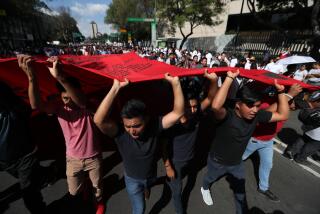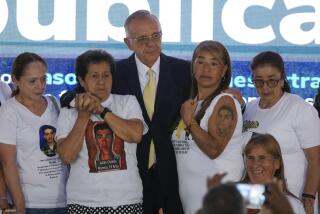IRA Offers a Sweeping Apology
- Share via
LONDON — Nearly 30 years after the Irish Republican Army’s “Bloody Friday” bombings left nine people dead, the paramilitary group issued a sweeping apology Tuesday for killing and injuring civilians during its long campaign of violence against British rule.
Although dismissed as inadequate by unionists, the IRA leadership’s statement was welcomed by the British government, which urged the republican group to turn its sentiments into reality.
Coming after complaints from unionists that confidence in the peace process was leaking away, the apology is seen by Britain as an important step.
On July 21, 1972--”Bloody Friday”--the IRA exploded more than 30 bombs in Belfast and elsewhere in Northern Ireland. Nine people were killed and more than 100 were injured.
“While it was not our intention to injure or kill noncombatants, the reality is that on this and on a number of other occasions, that was the consequence of our actions,” the IRA statement said.
“It is, therefore, appropriate on the anniversary of this tragic event that we address all of the deaths and injuries of noncombatants caused by us,” it said. “We offer our sincere apologies and condolences to their families.”
The peace process involves acceptance of past mistakes and of the hurt and pain the organization had caused people, the statement added.
About 3,600 people have died in Northern Ireland’s strife. More than half of those deaths are attributed to the IRA and other paramilitary groups that oppose the province’s union with Britain.
The IRA apology comes eight years after a similar apology by loyalist paramilitary forces, which supported ties with Britain. The IRA statement is expected to do little to mollify unionists who accuse the group of breaching a cease-fire.
But it is important as the IRA’s first clear and sweeping acknowledgment of the wrongs it committed, offering a signal of its commitment to the peace process. The IRA has expressed regret for individual acts of violence but never issued a broad apology for all the civilian deaths it caused.
Responding to the apology, British Prime Minister Tony Blair said the IRA “has never been further away from a resumption of violence.”
Northern Ireland Secretary John Reid said the important thing is to translate the IRA sentiments into reality.
“It’s an apology of unprecedented strength, an acknowledgment of the terrible, terrible pain that was caused throughout the years of conflict, particularly to civilians, but also wider than that,” Reid said.
“But the best way to acknowledge the past pain is to make sure the people of Northern Ireland have the confidence that events like this will never happen again,” he said.
Loyalist spokesmen dismissed the apology as “too little too late” and “words, words, words.”
Jeffrey Donaldson, a member of the Ulster Unionist Party who is opposed to the peace deal, said the apology is inadequate and belated.
“This statement comes very late in the day. It doesn’t go far enough, because we need to know no more innocent people will die at the hands of the IRA,” he said.
Northern Ireland’s peace process has been severely tested in recent months, with outbreaks of sectarian violence and accusations from Protestants that the IRA was breaching the cease-fire.
Blair has promised to announce steps to strengthen or enforce the cease-fire in the next week, after David Trimble, first minister in Northern Ireland’s power-sharing government and the leader of the Ulster Unionists, demanded tougher action.
Trimble warned that his administration would fall apart unless Britain took firm action.
In the last two years, the IRA has started decommissioning its illegal arsenal of weapons. But unionists accuse the republican guerrillas of testing new weapons in Colombia, claims that the group has denied.
In its statement, the IRA said the future would not be found in “denying collective failures and mistakes or closing minds and hearts to the plight of those who had been hurt. That includes all victims of the conflict, combatants and noncombatants.”
It said the peace process required that both sides acknowledge the losses of others.
The apology comes after the peak of Northern Ireland’s highly charged marching season, when unionists parade to commemorate past Protestant victories over Catholics.
In previous years, riots often erupted when the marches passed through Catholic areas.
Despite tensions in the peace process, the violence this summer was largely contained.
On July 12, traditionally the tensest day, police praised IRA leaders for helping defuse violence by sending out people to urge Catholic protesters not to throw rocks and gasoline bombs.
More to Read
Sign up for Essential California
The most important California stories and recommendations in your inbox every morning.
You may occasionally receive promotional content from the Los Angeles Times.













